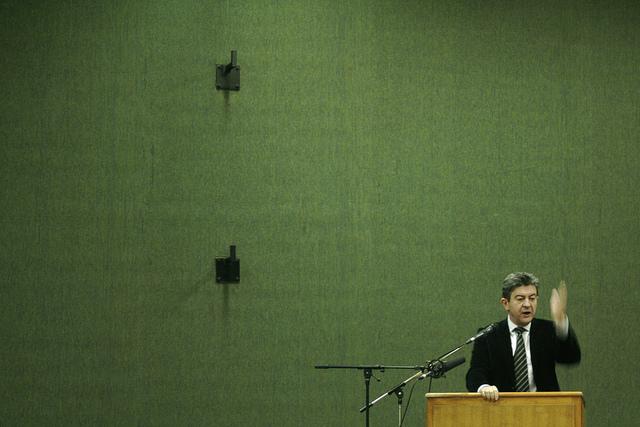
Will French voters have to choose between two extremes at their presidential election? In advance of the first round of voting this weekend, the fear that France will surrender to populism is significant, with far-right candidate Marine Le Pen at 24% in the polls and far-left candidate Jean-Luc Mélenchon at 18.5%.
Le Pen and Mélenchon differ in several significant ways. Mélenchon promotes a green revolution, for example, while Le Pen remains a climate change sceptic but their political programs have much in common.
Le Pen and Mélenchon have built their discourses on the key concept of ‘independence’. They claim their programs have the same goal, giving back to France an independence that the country has supposedly lost by engaging too deeply in globalisation. This is not a surprise from Le Pen, whose party, the National Front, has always promoted policies of withdrawal from globalisation. She says the French nation, its identity, its way of life, its culture and its language are gravely threatened by global standardisation and immigration.
The surprise comes in Mélenchon changing his tune from the Internationale to the Marseillaise. The leader of Unsubmissive France has made the restoration of the nation’s lost sovereignty a key part of his anti-globalisation discourse and claims, like Marine Le Pen, to defend the interests of the ‘forgotten’ France the workers and the farmers. Both candidates promise the solution to social decline lies in protectionism.
Both candidates are also strongly opposed to the EU, attributing the primary responsibility for the economic and unemployment crises to Brussels. They promise to put an end to European policies of austerity and they blame Angela Merkel’s Germany for the social crisis in European countries. Consequently, Le Pen and Mélenchon want France to leave the Euro Zone. Le Pen goes even further and promises to leave the EU itself: a post-Brexit Frexit. Internationally, both candidates call for reconciliation with Vladimir Putin and the restoration of a strong partnership with Russia, even saying that the recent use of chemical weapons in Syria wasn’t necessarily perpetrated by Assad.
While the candidates don’t share the same view on immigration, Mélenchon’s recent political shift on this issue may bring voters from the National Front to Unsubmissive France. In fact, while Mélenchon claimed during the 2012 elections that France should welcome all refugees, the far-left candidate now promotes the regularisation of illegal immigrants already in France but wants strict policies to avoid new large waves of immigration. While Mélenchon’s migration policy has progressively become tougher, it is not as strict as that of Le Pen who claims that she will simply stop migrants from entering France.
Both candidates claim their program is the only one dedicated to a redistribution of wealth in France. Significantly, Le Pen and Mélenchon are the only two candidates who promise to lower the retirement age to 60, which seems complete demagogery when the level of debt in the pension system is considered. Both also promote protectionist policies, including withdrawal from all free-trade agreements. French populism is quite left-wing economically, given the country’s long tradition of public involvement in the economy and strong welfare system. However, economic policy is difficult for both candidates. A large majority of French people remain attached to the Euro and believe that Mélenchon’s and Le Pen’s economic programs are not realistic and would lead France to bankruptcy.
Both Le Pen and Mélenchon present themselves as the only anti-establishment candidates, at a time when French voters are calling for far-reaching political renewal. But both very much belong to the system they claim to reject. Mélenchon is a former socialist minister and Marine Le Pen belongs to an extremely wealthy family long involved in politics.
The programs of these two populist candidates reflect a social crisis in France and the aspiration, as in the US and the UK, to return to an idealised—but inaccurately painted—past. Far-right and far-left strategies have been very successful in the same constituency, the working class and the least-privileged in the population, who have felt the main impact of ten years of economic crisis.
Admitting you voted for a populist candidate has lost its taboo in France and both candidates seem to have been able to bring their own rhythm and direction to the presidential campaign. But they offer nothing more than rhetoric based on tired tropes about a clash of civilisations and class struggle.